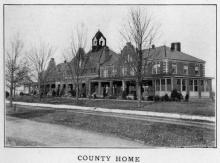You are here
Chapter 1 - Early Care
Like any community, Mecklenburg County has and has always had a shared responsibility to care for its most vulnerable and defenseless citizens. This exhibit traces the history of the county's efforts to meet its obligations from the colonial days to the mid-twentieth century.
In the colonial period, North Carolina followed English precedent in caring for the poor. The old common law recognized an established religion, and so it was up to the parish to oversee charitable work. When North Carolina became independent, the responsibility for care of the needy fell to the county instead. (Brown, p.24) As a result, citizens of the newly independent state of North Carolina paid for the relief of the destitute through local taxes rather than through offerings in houses of faith.
The early records of Mecklenburg County show that the County Court set aside funds each year for the maintenance of the poor. In the 1790s, for example, it was £80. The voters of the county elected “Wardens of the Poor” to disburse and account for it (“Wardens of the Poor,” accessed July 9, 2018). This method of funding set up a conflict of interests. On one hand, compassion and the law dictated that those without the means to support themselves were entitled to care from the rest of the community. On the other, leaders had to spend the people’s money wisely. Finding the right balance between providing support and saving money would be a recurring theme in Mecklenburg County’s history.
